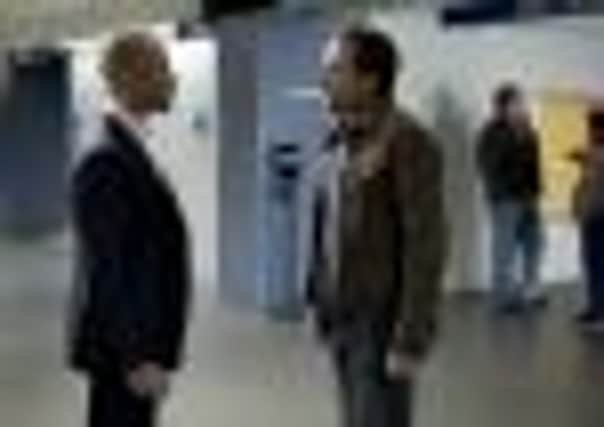Film review: Justice (15)


WELL that didn’t last long. After the Kick-Ass/Bad Lieutenant double-whammy suggested Nicolas Cage had rediscovered his flair for delivering performances as wigged-out as his barnet, Justice confirms he’s thoroughly settled back into sleepy-eyed, vaguely serviceable movie star mode, the one that stops short of supplying films as varied as National Treasure, Season of the Witch, even Drive Angry (in which he was cast as a vengeance-seeking escapee from Hell) with anything remotely memorable.
That’s too bad, because the only reason to see a bad Nicolas Cage movie – and the generically titled Justice is certainly that – is the sense of anticipation that comes from waiting to see Cage go cuckoo. Denying us that simple pleasure merely reduces Justice to the sort of anonymous, competently made, vaguely silly thriller that any mid-level movie star could carry. What makes this one worse is that it looks suspiciously like a movie that might have been conceived with a post-Taken Liam Neeson in mind.
Advertisement
Hide AdThere’s certainly more than a whiff of Neeson’s particular brand of straight-arrow humourlessness about Cage’s character, though the boost that Neeson’s still-fresh action persona might have given the film is diminished by Cage’s determination to fully embrace his own meek side. He stars as Will Gerard, an idealistic English teacher who handily foreshadows the film’s anti-violence themes by teaching Shakespeare to his inner-city pupils. Alas, when his musician wife Laura (January Jones) is raped and robbed on her way home from rehearsals one night, he soon finds his own beliefs and moral code challenged. Will’s first impulse, naturally, is to see the perpetrator suffer a horrible fate, but he knows he’s too educated and sensible to go all Charles Bronson, even though he doubts the abilities of the police to catch the scum responsible.
A possible solution to these conflicted feelings presents itself while Will is sitting in the hospital waiting room. He’s approached by a suit-wearing skinhead called Simon (Guy Pearce) who not only informs him that he knows who attacked his wife, but offers to take care of him for no financial remuneration, just the promise of reciprocal favour further down the line. Will of course says no, but just as quickly changes his mind, never really questioning how Simon knew to speak to him, why he’s so sure of the identity of his wife’s rapist, or indeed what a mysterious, skinhead-sporting stranger who hangs around hospitals and appears to run a murderous vigilante network might ask of him in the future.
When the initial deed is done – leading to the laziest acceptance of a cause of death by movie cops since the opening of The Fugitive – Will tries to settle back into life with his recuperating wife, whom he gently assures never has to worry about testifying in court because her attacker committed suicide. It’s not long, though, before Will starts receiving phone calls from Simon, who exerts a menacing control over him by calmly letting him know that he knows things – personal things – about his life during their conversations. Never mind that said information is the kind of stuff anyone with access to Google could find out if they had a mind to do so. It’s enough to spook Will into agreeing to carry out the tasks required of him.
At first these are just menial, innocuous, if slightly creepy things – like posting a letter or following a woman and her child round the zoo. But sure enough, things start to escalate and Will, who – lest we forget – has already willingly become an accessory to a murder, baulks the moment he’s asked to get his own hands bloody.
As Will finds himself framed and chased by the cops, what follows is a fairly rote paranoid conspiracy thriller that falls into the everyone-is-after-you mould of classics like The Parallax View and Three Days of the Condor. That it has no understanding of what made those kinds of films gripping in the first place is sadly all too evident from the rather laughable 1970s-eque notions about the newspaper business it suddenly adopts. Apparently we’re supposed to buy into the notion that a hard-bitten investigative journalist is about to expose Simon’s organisation to the world, yet the film also wants us to believe that Will can easily wander round the newsroom of said journalist’s employers, chatting to one of his colleagues even after his face has been plastered all over the paper’s front page.
Gaffes like this ensure the sinister organisation at the film’s centre feels more like a method of excusing the chasm-like plot holes than a valid way of exploring its morally equivocal notions of vigilante justice.
Advertisement
Hide AdIt’s not helped by that fact that director Roger Donaldson – an Australian journeyman so vanilla it’s a wonder he’s never made a Bond film – fails to inject the scenes with any urgency. Like Cage, he dials everything down, serving up a mild ride rather than a wild one.
Rating: **